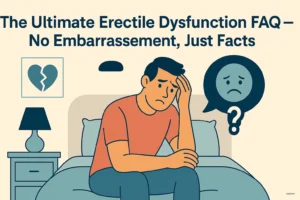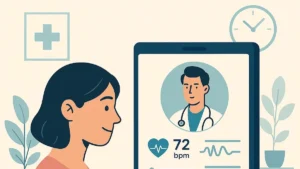How Hormone Imbalance and Sleep Are Secretly Connected
You are turning and turning. It is once more at 3 a.m. However, the culprit might not be stress or screens; it could be hormone imbalance and sleep disruption working behind the scenes.
Sleep is governed by hormones, the software that runs the device. When just one of them, cortisol or melatonin, is out of whack, your sleep schedule goes bust.
So, the hormone changes disrupt your nights, and the question is, what can you do to get your deep sleep back naturally?

Your Hormonal Clock to Sleep
Hormones act as the body’s timekeepers. When they work well, they ensure that your sleep-wake pattern is on schedule. But disrupt one of them, and your entire internal watch will be disrupted.
Cortisol and Insomnia
Your stress hormone cortisol must peak in the morning and drop off at night. However, when stress is persistent, the cortisol level remains elevated, and your brain thinks it is daytime. This causes insomnia, interrupted sleep, and the sensation of being wired and tired.
Melatonin Imbalance
Melatonin is the hormone that signals bedtime to your brain. Too much screen time, irregular bedtimes, or even nutrient deficiencies can cause melatonin imbalance, delaying sleep onset or shortening total sleep time.
There are Indications that Your Sleeping Problems Could Be Hormonal
Your sleeping problems may be related to hormonal issues when they are accompanied by:
- Chills or night sweats
- Weight gain or loss
- Menstrual dysfunction or lack of sex drive
- Mood swings and brain fog
- Getting up in the middle of the night, 2 -4 a.m.
Those most liable to hormonally related sleep disturbances are women in perimenopause or men with low testosterone.

All-natural Solutions to Reset Your Sleep Rhythm
There are natural ways to rebalance hormones without prescribing medications, and those methods involve regular, tested approaches.
1. Restore Your Cortisol Rhythm
- Wake up to natural sunlight: This anchors your cortisol to be high in the morning.
- No caffeine in the afternoon: It extends the evening occupation of cortisol.
- Get used to wind-down procedures: Cortisol peaks can be decreased by reading or breathing exercises.
2. Nourish Your Melatonin
- No screens past 9 p.m.: Blue light postpones the melatonin secretion.
- Consume tryptophan: Rich foods such as oats, turkey, and almonds.
- Magnesium supplement: Magnesium is a mineral that enhances the production of melatonin.
3. Adaptogens with Adaptogens
Herbs such as ashwagandha and rhodiola do not override hormones; they inch your body toward balance, soothing cortisol without putting it out of commission.

When Natural Isn’t Enough: Hormone Therapy for Better Sleep
When sleep difficulties continue even after lifestyle improvements, medical solutions may be worth considering. Hormone therapy for better sleep can help correct serious imbalances that diet or supplements can’t touch.
At our Best Primary Care Clinic in Las Vegas, we focus on individualised hormone replacement therapy in both men and women.
Whether it is bioidentical progesterone or testosterone rebalancing, our treatments go to the root of the problem: not only do we treat the symptoms. but also
Wrap-Up: Correcting the hormone imbalance is the start to reclaiming sleep
You must fix your hormone imbalance and sleep cycle at the root to fix your sleep. It could be cortisol mayhem or melatonin malfunctions, but your body desires rhythm.
Begin with baby steps: adjust the light you are exposed to, control your meals, and use adaptogens. However, when the symptoms prevail, hormone therapy could be your next step to quality sleep and improved mornings.
FAQs
1. Is it possible that hormone imbalance can lead to chronic insomnia?
Absolutely. Sleep is controlled by hormones such as cortisol, progesterone, and melatonin. When they are not in tandem, insomnia is a regular occurrence even when you have the best routine.
2. How is melatonin imbalance diagnosed?
By saliva or blood sample tests, which monitor the levels of melatonin production during your sleep pattern. Low levels can prove a deficiency at night.
3. Is cortisol able to keep me awake at night?
Yes. Cortisol is not only a stress hormone but also regulates alertness. Evening cortisol levels may inhibit sleep.
4. Is sleep hormone therapy safe?
Hormone therapy, when controlled by a doctor, as the ones at HEALOR, can become a safe and effective way of solving the problem of constant sleep interruption.
5. How can I rebalance my hormones quickly?
First, concentrate on sleep hygiene, stress management, and diet. Targeted supplements and adaptogens can help. Medical assessment is important for chronic problems.








